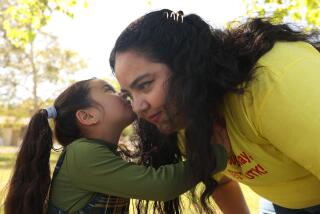State Proposes Anonymous Testing of Infants for AIDS
- Share via
California health officials are proposing to test 120,000 babies to assess the spread of the AIDS virus in child-bearing women and newborns.
Under the proposal, every infant born in the state during the three-month study period would be tested anonymously for AIDS antibodies.
The proposed study, now being reviewed by the federal Centers for Disease Control, would apparently be the largest study of its type ever to be conducted.
“This (study) will provide the first hard data as to how far the AIDS virus has penetrated into what is generally regarded as a low-risk group--heterosexual women of child-bearing age,” said Dr. George C. Cunningham, chief of the state Department of Health Services’ Berkeley-based genetic disease branch, which is cooperating with the department’s Office of AIDS in proposing the research program.
The proposed program would be conducted as part of an ongoing state program that tests the blood of all newborns to detect conditions that can cause mental retardation.
To maintain anonymity, parents and physicians would be unable to learn the test results, which would be presented only in statistical tables, compiled by the age and race of the mother, the county of birth, and the county and zip code of the mother’s residence.
CDC is expected to decide next week whether it will fund California’s $450,000 proposal as part of the centers’ nationwide program to obtain more accurate data about the extent of AIDS virus infections, an agency official said. If federal funding cannot be obtained, there are no plans for the state to fund the study itself.
The California proposal is similar to--but considerably more ambitious than--two recently completed surveys. A New York state survey of 19,157 newborn blood specimens showed that one in 61 babies in New York City carried AIDS virus antibodies. A Massachusetts survey of 30,000 blood specimens showed an infection rate of 0.21% among child-bearing women.
Half Are Infected
A positive AIDS antibodies test on a baby indicates that its mother is a carrier of the AIDS virus but does not necessarily mean that the baby is infected. Only about half the babies who test positive are carrying the virus. The others test positive simply because they receive the antibody proteins from their mother; the proteins are subsequently shed over a period of several months.
“If we find very few cases, it can be argued that those infected are the women in high-risk groups,” such as intravenous drug users or the heterosexual partners of known AIDS virus carriers, Cunningham said in a telephone interview. “If we find as big a rate as in New York City, that is going to reopen the debate about the cost-benefit of using prenatal and premarital testing as means to try to control the spread of the disease.”
High Number of Addicts
The high AIDS virus infection rate in New York City newborns is believed to reflect the high rate of AIDS virus infections among the city’s estimated 200,000 intravenous drug addicts. By comparison, California is believed to have significantly fewer intravenous drug users infected by the AIDS virus.
The proposed state study is possible because, since 1980, almost all California newborns have been screened for three inherited, but preventable, forms of mental retardation--galactosemia, hypothyroidism and PKU, or phenylketonuria.
Under the newborn screening program, the heel of each baby is stuck with a needle before hospital discharge and spots of blood are collected on a piece of filter paper. Similar sampling is mandated for babies born at home as well. Through the program, a total of 120 to 130 mental retardation cases are prevented each year, Cunningham said.
Specimens Kept Frozen
Under the proposal, the Department of Health Services’ clinical chemistry laboratory in Berkeley would anonymously perform AIDS antibodies tests on blood left over after the other analyses. The actual testing period has yet to be determined but, because the filter paper specimens are kept in frozen storage, any months during 1988 could be selected. About 500,000 babies are born in California each year.
While the department has not publicly announced its proposal, which was sent to the Centers for Disease Control in December, officials said that it was not meant to be a secret screening plan.
“We don’t want some women not having their babies screened for preventable metabolic disorders because they in any way fear that they themselves or their babies will be harmed or stigmatized if they are selected in this program,” Cunningham said. “There is no way anybody is going to be able to find out an individual’s results.”
Seek Testing
Public health officials suggest that women of child-bearing age who are concerned that they may be infected with the AIDS virus seek voluntary, confidential testing before they become pregnant or in the early stages of pregnancy.
Most physicians advise women who test positive to defer pregnancy until more is known about treating the disease and preventing transmission of the AIDS virus to newborns. Some physicians also advise infected women in the early stages of pregnancy to consider having an abortion.
As of Monday, 50,820 cases of AIDS had been reported to the CDC, including 3,679 in adult women. These included 1,858 cases in female intravenous drug users, 1,078 heterosexually acquired cases, 418 cases acquired through contaminated blood products and 325 cases where the method of transmission has not been determined.
More to Read
Sign up for Essential California
The most important California stories and recommendations in your inbox every morning.
You may occasionally receive promotional content from the Los Angeles Times.













![Vista, California-Apri 2, 2025-Hours after undergoing dental surgery a 9-year-old girl was found unresponsive in her home, officials are investigating what caused her death. On March 18, Silvanna Moreno was placed under anesthesia for a dental surgery at Dreamtime Dentistry, a dental facility that "strive[s] to be the premier office for sedation dentistry in Vitsa, CA. (Google Maps)](https://ca-times.brightspotcdn.com/dims4/default/07a58b2/2147483647/strip/true/crop/2016x1344+29+0/resize/840x560!/quality/75/?url=https%3A%2F%2Fcalifornia-times-brightspot.s3.amazonaws.com%2F78%2Ffd%2F9bbf9b62489fa209f9c67df2e472%2Fla-me-dreamtime-dentist-01.jpg)